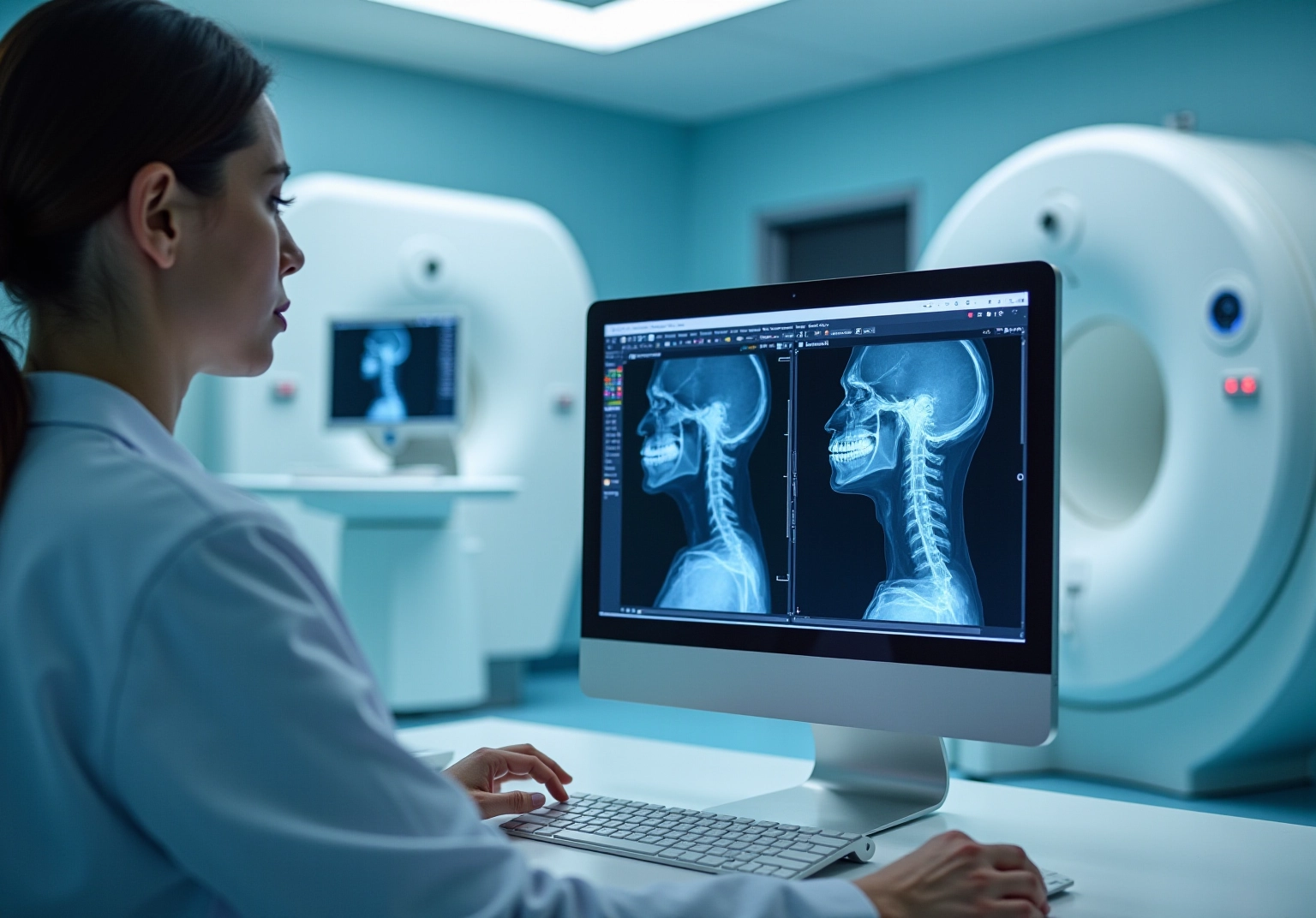
The article “10 Milestones in the History of AI in Healthcare” highlights pivotal developments that have significantly influenced the integration of artificial intelligence within the healthcare sector. It delineates a range of milestones, including:
These innovations have not only transformed patient care but also improved operational efficiency and ensured compliance across healthcare settings.
The evolution of artificial intelligence in healthcare is undeniably transformative, marking significant milestones that have reshaped patient care and operational efficiency. This article explores the pivotal advancements defining AI’s journey in the medical field, emphasizing how technologies such as predictive analytics, telemedicine, and AI-driven diagnostics are revolutionizing patient outcomes.
However, as these innovations proliferate, they raise critical questions regarding ethical considerations and the potential for bias. What challenges must the healthcare industry navigate to fully harness AI’s potential while ensuring responsible use?
Inferscience has established itself as a leader in HCC coding by leveraging AI-driven solutions that significantly streamline the coding process for medical providers. The HCC Assistant, the company’s flagship product, automates the collection and analysis of clinical data, providing real-time coding suggestions with an impressive 97% accuracy rate. This automation not only alleviates administrative burdens but also enhances coding accuracy, enabling service providers to maximize their funding from Medicare Advantage contracts.
As noted by a medical leader, “The integration of AI in coding processes has transformed our approach, marking a significant point in the history of AI in healthcare, allowing us to focus more on those receiving treatment while ensuring compliance and precision.”
By harnessing advanced technologies such as natural language processing, Inferscience is contributing to the history of AI in healthcare by revolutionizing the medical coding landscape, making it more efficient and compliant with evolving regulations.
Real-world applications demonstrate that medical facilities utilizing the HCC Assistant, such as MultiCare, have seen an average increase of 35% in Risk Adjustment Factor (RAF) scores, underscoring the tool’s effectiveness in improving financial outcomes while allowing providers to prioritize individual patient needs.

The incorporation of AI into electronic health records (EHRs) represents a significant milestone in the history of AI in healthcare, fundamentally transforming information management for individuals. The history of AI in healthcare shows that AI algorithms possess the capability to analyze extensive datasets, unveiling patterns and trends that significantly enhance clinical decision-making. The history of AI in healthcare shows that by automating routine tasks such as data entry and retrieval, AI empowers medical providers to devote more time to client support, rather than administrative duties. This shift not only enhances the precision of patient records but also simplifies medical delivery, ultimately leading to improved patient outcomes.
For instance, Portsmouth Hospitals reported a remarkable 33% increase in maternity appointment capacity through intelligent automation, demonstrating how AI can alleviate administrative burdens and enhance operational efficiency. Furthermore, a substantial 86% of medical organizations currently utilize AI extensively, which reflects a growing recognition of the history of AI in healthcare and its potential to optimize workflows and enhance care quality (Keragon Team).
However, it is crucial to acknowledge the persistent concerns regarding biases in AI-generated medical advice, indicating the necessity for careful oversight as AI continues to evolve within the healthcare sector.
The history of AI in healthcare shows how AI algorithms are revolutionizing disease diagnosis, significantly enhancing clinical accuracy and transforming the healthcare landscape. These advanced systems analyze medical images and individual data, enabling the identification of diseases at earlier stages compared to traditional methods. For instance, AI-driven diagnostics have demonstrated a remarkable 94.5% accuracy rate in detecting breast cancer through mammograms, while simultaneously reducing false-positive diagnoses by an impressive 88%.
Furthermore, AI algorithms process and interpret MRI scans 60% quicker, effectively reducing wait times and facilitating prompt interventions. This evolution in diagnostic capabilities not only results in improved outcomes for individuals but also paves the way for personalized treatment plans based on accurate diagnoses. The integration of AI in medical imaging demonstrates a remarkable 43% enhancement in five-year survival rates for patients identified through AI-augmented diagnostics, reflecting the history of AI in healthcare and its essential role in advancing medical service delivery.
However, it is crucial to acknowledge the challenges associated with AI in the medical field, such as data privacy concerns and the necessity for human oversight. With the AI diagnostics sector projected to reach $67.3 billion by 2030, expanding at a CAGR of 40.2%, the future potential of AI in medical services is indeed considerable.

AI has significantly transformed telemedicine, enhancing the efficiency of remote medical delivery. By utilizing AI-driven tools, medical providers can conduct virtual consultations, monitor individual health remotely, and analyze data in real-time. This technological progress not only enhances access to services for individuals in underserved regions but also streamlines workflows for healthcare providers. For instance, AI algorithms optimize client triage and follow-up processes, ensuring timely and appropriate care regardless of location.
Real-world applications, such as Mayo Clinic’s AI-driven remote monitoring system, have demonstrated a remarkable 40% decrease in hospital readmissions, underscoring the effectiveness of AI in improving healthcare outcomes. The global AI in telemedicine market is projected to reach US$ 193.30 Billion by 2033, highlighting the growing significance of AI in this field. Furthermore, medical providers report that incorporating AI technologies has led to improved operational efficiency, with 80% observing a reduction in staff burnout.
The KardiaMobile app exemplifies another application of AI, allowing individuals to document their heart’s electrical activity and analyze ECG readings for arrhythmias. As AI continues to evolve, its role in telemedicine will be crucial in shaping the future of medical service delivery.
Predictive analytics, powered by AI, is revolutionizing medical services by enabling providers to anticipate individual needs and outcomes with precision. The history of AI in healthcare shows that by examining historical data and discerning trends, AI can identify individuals at risk for specific conditions, paving the way for proactive interventions.
For instance, predictive models can forecast hospital readmission rates, empowering medical providers to implement targeted strategies that significantly reduce these occurrences. This proactive approach not only enhances treatment but also optimizes resource allocation; AI-driven predictive analytics can forecast outcomes and anticipate staffing and resource needs, ultimately lowering medical costs.
As healthcare leaders acknowledge the significance of the history of AI in healthcare for anticipating individual requirements, the integration of predictive analytics is becoming essential for improving overall healthcare delivery. Notably, Mayo Clinic’s AI scheduling system improved care flow by 15% and cut costs by 12%, illustrating the financial benefits of such technologies.
However, successful implementation necessitates a workforce adept in data science and analysis to navigate the intricacies of these advanced systems.
AI is revolutionizing medical imaging, capturing attention by significantly enhancing diagnostic capabilities through advanced algorithms. These sophisticated algorithms analyze images from X-rays, MRIs, and CT scans with unprecedented speed and accuracy.
For example, AI systems can detect subtle changes in imaging that may indicate early-stage diseases—changes that human eyes might overlook. This capability not only boosts diagnostic precision but also accelerates the decision-making process for treatment, ultimately leading to improved outcomes for individuals.
The integration of AI in medical imaging is not just a technological advancement; it is a transformative solution that addresses critical challenges in healthcare.

AI-driven virtual health assistants are revolutionizing user engagement by delivering tailored support and information that meets individual needs. These sophisticated tools efficiently manage inquiries, schedule appointments, and issue reminders for medications and follow-ups. By leveraging natural language processing, virtual assistants facilitate meaningful interactions, significantly enhancing the experience for users. This technology not only boosts user satisfaction but also empowers individuals to take an active role in their medical care, resulting in improved adherence to treatment plans.
The history of AI in healthcare shows that as healthcare organizations increasingly embrace AI solutions, this trend is set to expand, with projections indicating a compound annual growth rate of 40.2 percent in the AI healthcare market from 2022 to 2029.
Real-world applications, such as Inferscience’s HCC Assistant, highlight the history of AI in healthcare by showcasing how AI can streamline workflows and enhance interactions through the automation of clinical data collection and the provision of coding suggestions at the point of care, ultimately leading to better health outcomes and operational efficiency.
AI is revolutionizing drug discovery by significantly accelerating the identification of potential therapeutic candidates. By leveraging advanced machine learning algorithms, researchers can swiftly analyze extensive datasets, pinpointing promising compounds and predicting their efficacy with remarkable precision. This innovative approach not only reduces the time and costs traditionally associated with drug development but also enhances the likelihood of success in clinical trials. For instance, AI-designed drugs have demonstrated an impressive 80-90% success rate in Phase I trials, compared to the 40-65% success rate of conventional methods.
Notably, companies like Recursion have showcased the efficiency of AI by transitioning drug candidates from target initiation to new drug application-enabling studies in about 18 months—significantly faster than the industry average of around 42 months. This capability has been crucial in identifying new drug candidates for complex diseases, facilitating a faster transition from laboratory research to clinical trials, and ultimately enhancing access to groundbreaking therapies.
However, challenges remain in AI drug development, particularly in predicting patient-specific issues such as toxicity. As AI continues to advance, its incorporation into therapeutic development processes is anticipated to produce even greater efficiencies and breakthroughs. This includes applications in risk adjustment tools such as Inferscience’s HCC Assistant, which improves coding accuracy and efficiency.
The incorporation of AI in medical services necessitates a thorough examination of ethical issues, particularly concerning privacy and information security. Recent statistics reveal that:
Real-world examples underscore the potential dangers of insufficient data security. In 2024, breaches impacted approximately one billion individuals, illustrating the vital necessity for robust cybersecurity measures. Cybercrimes compromise the security of 80% of businesses globally, further accentuating the inherent risks. Healthcare leaders advocate for the adoption of AI technologies that prioritize individual privacy, with 89% of physicians stressing the importance of transparency regarding the sources of AI-generated information.
As AI continues to advance, the medical sector must ensure that these technologies are trained on diverse datasets to mitigate algorithmic bias and prevent the worsening of existing health disparities. By addressing these ethical considerations, the medical sector can foster trust in AI technologies, ultimately promoting equitable access to services and enhancing outcomes for individuals.
The future of medical services will be greatly influenced by the history of AI in healthcare, which is set to usher in revolutionary advancements that will significantly enhance care for individuals and operational efficiency. The history of AI in healthcare highlights how emerging technologies, particularly generative AI and advanced machine learning algorithms, are anticipated to play a crucial role in personalizing treatment plans, refining diagnostic accuracy, and streamlining workflows.
For instance, generative AI can analyze individual genetic data and medical histories to tailor treatment strategies, leading to better outcomes for patients, especially in oncology, where it predicts the effectiveness of cancer therapies based on a person’s genetic makeup. As medical organizations increasingly adopt these technologies, it is imperative for them to remain abreast of AI advancements to maintain a competitive edge and deliver high-quality service.
With 80% of hospitals currently utilizing AI to enhance patient care and operational efficiency, and reporting an ROI of $3.20 for every $1 invested—often within 14 months of implementation—the integration of these tools is not merely advantageous but essential for the future of patient care. However, it is crucial to recognize that 83% of U.S. consumers perceive the potential for AI to err as one of the most significant barriers to its adoption. Consequently, healthcare leaders must navigate these challenges while harnessing the transformative potential of generative AI.
As Serhii Leleko, an ML & AI Engineer at SPD Technology, remarked, ‘The most intriguing thing about Generative AI technologies is their potential for driving the innovation forward.
The evolution of artificial intelligence in healthcare signifies a transformative journey that is reshaping patient care and enhancing operational efficiency. By leveraging AI-driven solutions like Inferscience’s HCC Assistant for medical coding and integrating predictive analytics that anticipate patient needs, the milestones in AI healthcare history highlight the technology’s crucial role in improving outcomes and streamlining processes.
Key advancements—including the utilization of AI in electronic health records, disease diagnosis, telemedicine, and drug discovery—demonstrate the extensive impact of AI on the healthcare landscape. AI’s capability to enhance diagnostic accuracy, optimize patient data management, and facilitate remote healthcare delivery illustrates its potential to tackle critical challenges faced by medical providers today. Furthermore, ethical considerations surrounding privacy and transparency remain paramount as the healthcare sector navigates the complexities of responsible AI integration.
As the future of healthcare unfolds, embracing AI innovations is vital for enhancing patient experiences and sustaining a competitive edge within the industry. The ongoing advancements in AI possess the power to revolutionize healthcare delivery, rendering it more personalized, efficient, and equitable. Stakeholders must prioritize understanding and addressing the challenges of AI adoption, ensuring these transformative technologies are effectively harnessed to foster trust and improve health outcomes for all individuals.